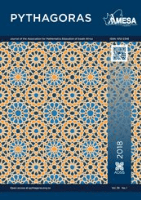
Pythagoras
Scope & Guideline
Advancing the dialogue between Education and Mathematics.
Introduction
Aims and Scopes
- Mathematics Teaching Methodologies:
The journal emphasizes research on various teaching methodologies, particularly those that enhance student engagement and understanding in mathematics, such as problem-solving, discourse-based instruction, and the use of technology. - Curriculum Development and Analysis:
It focuses on the design, implementation, and evaluation of mathematics curricula, examining how these curricula prepare students for real-life applications and citizenship. - Assessment and Learning Strategies:
Research on assessment practices and learning strategies is a core area, particularly how they influence student outcomes and support diverse learning needs. - Technology Integration in Mathematics Education:
The journal explores the use of technological tools and platforms, such as GeoGebra and online learning environments, to enhance mathematics teaching and learning. - Professional Development for Educators:
It highlights the importance of professional development for teachers, focusing on improving pedagogical skills and mathematical knowledge to better support student learning.
Trending and Emerging
- Student-Centered Learning and Engagement:
Recent publications indicate a growing focus on student-centered approaches, emphasizing the importance of engaging learners actively in their mathematical education through discourse and problem-solving. - Impact of Technology on Learning:
There is an increasing trend towards exploring the impact of technology, particularly during and following the COVID-19 pandemic, highlighting how digital tools can facilitate mathematics learning and teaching. - Mathematics Education in Context:
Emerging themes reflect a trend towards contextual mathematics education, where the relevance of mathematics is linked to real-world applications and societal issues, such as citizenship and life preparation. - Cognitive and Emotional Aspects of Learning:
Research has begun to highlight the cognitive and emotional factors influencing learning strategies and motivation, indicating a more holistic approach to understanding mathematics education. - Professional Development and Resilience in Teaching:
There is a noticeable increase in research focusing on professional development for teachers, particularly in building resilience and adaptive teaching strategies in challenging educational contexts.
Declining or Waning
- Traditional Pedagogical Approaches:
There is a noticeable decline in research focused on traditional, lecture-based teaching methods, suggesting a shift towards more interactive and student-centered pedagogical approaches. - General Mathematics Content Knowledge:
Research focusing solely on general mathematics content knowledge without integration of context or application appears to be waning, as the journal increasingly emphasizes applied mathematics education. - Basic Skill Acquisition:
There is a reduction in studies specifically targeting basic skill acquisition in mathematics, indicating that researchers are now more interested in higher-order thinking and problem-solving capabilities.
Similar Journals
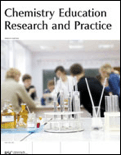
Chemistry Education Research and Practice
Empowering Educators with Cutting-Edge Chemistry InsightsChemistry Education Research and Practice is a prominent journal dedicated to advancing the field of chemistry education through rigorous research and innovative practices. Published by the Royal Society of Chemistry, this journal, with an ISSN of 1109-4028 and an E-ISSN of 1756-1108, operates out of Greece and has established itself as a leading voice in the intersection of chemistry and educational methodology. With a remarkable impact factor and ranking in the top quartiles (Q1) for both Chemistry and Education in 2023, it appeals to a diverse audience of researchers, educators, and practitioners who are passionate about enhancing chemistry instruction and learning experiences. The journal spans a wide range of topics, aiming to promote and disseminate high-quality research that informs pedagogical strategies, curriculum development, and educational policy. By providing a platform for vibrant discussions and new ideas, Chemistry Education Research and Practice plays a crucial role in shaping the future of chemistry education worldwide and continues to impact the academic community significantly.
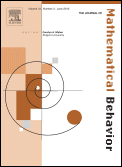
Journal of Mathematical Behavior
Unlocking the Secrets of Mathematical BehaviorThe Journal of Mathematical Behavior, published by ELSEVIER SCIENCE INC, is a premier interdisciplinary journal dedicated to the exploration of mathematical thinking, learning, and education. With a strong history of publication since 1994 and converging towards 2024, this journal offers vital insights and innovative research in the fields of Applied Mathematics, Applied Psychology, and Education, holding notable rankings in various categories, including Q1 in Education and Q2 in both Applied Mathematics and Psychology as of 2023. The journal is positioned favorably in Scopus rankings, highlighting its impact in the realms of Mathematics and Education. It serves as a critical platform for researchers, educators, and practitioners aiming to enhance pedagogical strategies and foster effective mathematical understanding. Although it does not offer open access, the journal remains a cornerstone for advancing knowledge and dialogue within the mathematical education community,** making it an essential resource for anyone invested in the complexities and applications of mathematical behavior.

Journal of Science Education and Technology
Integrating Innovation in Science Education.The Journal of Science Education and Technology, published by SPRINGER, stands as a premier platform in the fields of education and engineering, recognized with a prestigious Q1 ranking in both categories as of 2023. With an ISSN of 1059-0145 and an E-ISSN of 1573-1839, this journal serves as a pivotal resource for researchers, educators, and practitioners alike, emphasizing the integration of scientific inquiry and technological advancements in educational contexts. Since its inception in 1992, the journal has consistently provided high-quality, peer-reviewed research that shapes contemporary practices and methodologies in science education. With its notable Scopus rankings, including a 95th percentile in Social Sciences Education, the journal is essential for anyone eager to enhance their understanding of effective teaching in STEM fields. While the journal is not open access, its contributions are invaluable to advancing knowledge and innovations that are crucial for the progressive education landscape, making it a must-read for scholars and students committed to excellence in science education.

International Journal of Mathematical Education in Science and Technology
Advancing Knowledge in Mathematical Education and TechnologyThe International Journal of Mathematical Education in Science and Technology, published by TAYLOR & FRANCIS LTD, is a leading academic journal dedicated to the interdisciplinary field of mathematical education, emphasizing the integration of science and technology. With an ISSN of 0020-739X and E-ISSN 1464-5211, the journal serves as a vital resource for researchers, educators, and practitioners seeking innovative methodologies and pedagogical frameworks in mathematics education. As of 2023, it has achieved a prestigious standing in Q2 quartiles across three categories: Applied Mathematics, Education, and Mathematics (miscellaneous), with notable rankings in Scopus, including 16th in Mathematics and 486th in Social Sciences Education. The journal, which has been converging its research and findings since 1970 and will continue to do so until 2024, is not available as an open access publication, but offers a wealth of insights for those committed to enhancing mathematical understanding in various educational contexts. Its emphasis on cutting-edge research makes it a crucial conduit for advancements in both theoretical and practical aspects of mathematics education.

Avances de Investigacion en Educacion Matematica
Connecting Researchers and Educators for Enhanced Learning Outcomes.Avances de Investigacion en Educacion Matematica, published by the SOC ESPANOLA INVESTIGACION & EDUCACION MATEMATICA-SEIM, is a prominent open-access journal dedicated to advancing research and education in the field of mathematics. Since its inception in 2018, this journal has provided a platform for scholars to disseminate innovative findings and pedagogical strategies that enrich mathematical understanding and enhance educational practices. With an impact factor that places it in the Q2 quartile for both Education and Mathematics (Miscellaneous) categories, the journal ranks 179th among General Mathematics publications and 936th in Education, indicating a growing influence within the academic community. Based in Spain, Avances de Investigacion en Educacion Matematica is committed to fostering collaboration and extensive discourse among researchers and educators alike, empowering them to address contemporary challenges in mathematics education. As an open-access journal since 2022, it offers both researchers and practitioners unrestricted access to valuable resources and articles, ensuring that cutting-edge research is widely available to those who shape the future of mathematics education.
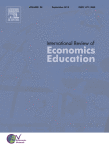
International Review of Economics Education
Exploring New Frontiers in Economics EducationThe International Review of Economics Education, published by Elsevier Science Ltd, serves as a vital platform for disseminating high-quality research in the field of economics education. With an ISSN of 1477-3880 and an E-ISSN of 2352-4421, this esteemed journal features a range of scholarly articles that evaluate and enhance teaching methodologies, curriculum development, and educational practices in economics. Operating out of the United Kingdom, and recognized within the Q2 category in Education for 2023, it stands out in the competitive landscape of social sciences with a Scopus rank of #333 out of 1543, positioning it in the 78th percentile among its peers. Researchers, educators, and students will find the journal's focus on innovative economics teaching approaches particularly relevant for advancing pedagogical techniques and improving student engagements. While the journal does not currently offer Open Access options, its contributions are essential for anyone dedicated to the scholarly advancements in economics education from 2003 to the present and beyond.

International Journal for Technology in Mathematics Education
Transforming mathematics education through technology.International Journal for Technology in Mathematics Education (ISSN: 1744-2710, E-ISSN: 2045-2519) is a pioneering platform published by Research Information Ltd that focuses on the interplay between technology and mathematics education. Established to bridge the gap between pedagogical practices and technological advancements, this journal connects researchers, educators, and practitioners in a bid to enhance teaching methodologies and optimize learning outcomes in mathematics. Although its coverage in Scopus was discontinued after 2020, it continues to be a vital resource for those interested in the integration of technology into educational settings. With its significant emphasis on interdisciplinary approaches, the journal has garnered attention in the realms of social sciences and computer science, with Scopus rankings reflecting its niche contributions. This journal is crucial for professionals aiming to explore innovative techniques in mathematics education, making it an invaluable addition to any academic library.

Medical Science Educator
Fostering dialogue at the intersection of medicine and education.Medical Science Educator, published by SpringerNature, is an esteemed journal committed to advancing the intersection of educational methodologies and medical science. With a significant impact in its field, this journal holds a Q2 ranking in both Education and Medicine (miscellaneous) categories as of 2023, reflecting its dedication to high-quality research and scholarly dialogue. Operating in a digital format, the journal uniquely facilitates access to pivotal studies from its inception in 2011 until 2024, fostering innovation in medical education. The latest rankings highlight its credibility, placing it at the 63rd percentile in Social Sciences - Education and the 56th percentile in Medicine - Medicine (miscellaneous) within Scopus. This platform serves as an invaluable resource for educators, researchers, and practitioners aiming to enhance teaching practices and shape the future of medical education.

REDIMAT-Revista de Investigacion en Didactica de las Matematicas
Fostering Collaborative Research in Mathematics DidacticsREDIMAT-Revista de Investigacion en Didactica de las Matematicas, published by HIPATIA PRESS, is a leading open-access journal dedicated to advancing research in mathematics education, particularly focusing on didactic methodologies and pedagogical innovations. Since its inception in 2012, the journal has fostered an inclusive platform for academics, educators, and practitioners to disseminate their findings and insights, significantly contributing to the field of mathematics education. With an ISSN of 2014-3621, REDIMAT aims to promote high-quality research and collaboration across diverse educational contexts. The journal not only emphasizes empirical studies but also theoretical developments and practical applications that enhance teaching and learning of mathematics worldwide. By providing a valuable resource for researchers, professionals, and students alike, REDIMAT plays a pivotal role in shaping the future of mathematics education research.
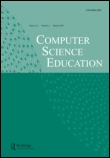
Computer Science Education
Shaping Tomorrow's Computer Scientists TodayComputer Science Education is a prestigious journal published by ROUTLEDGE JOURNALS, TAYLOR & FRANCIS LTD, focusing on the critical intersection of computer science and educational practices. Established in 1988, this journal has become a cornerstone for researchers, educators, and practitioners interested in enhancing teaching methodologies and learning outcomes in computer science. With an impressive ranking within the top quartile (Q1) in both Computer Science (miscellaneous) and Education categories for 2023, as well as high Scopus percentile placements, it underscores its significance in advancing the discipline. The journal offers a platform for innovative research encompassing diverse educational environments and approaches, and while it currently does not offer open access options, it remains committed to disseminating high-quality scholarly work. As a vital resource for anyone looking to contribute to and understand the evolving landscape of computer science education, Computer Science Education continues to shape the future of learning in this dynamic field.